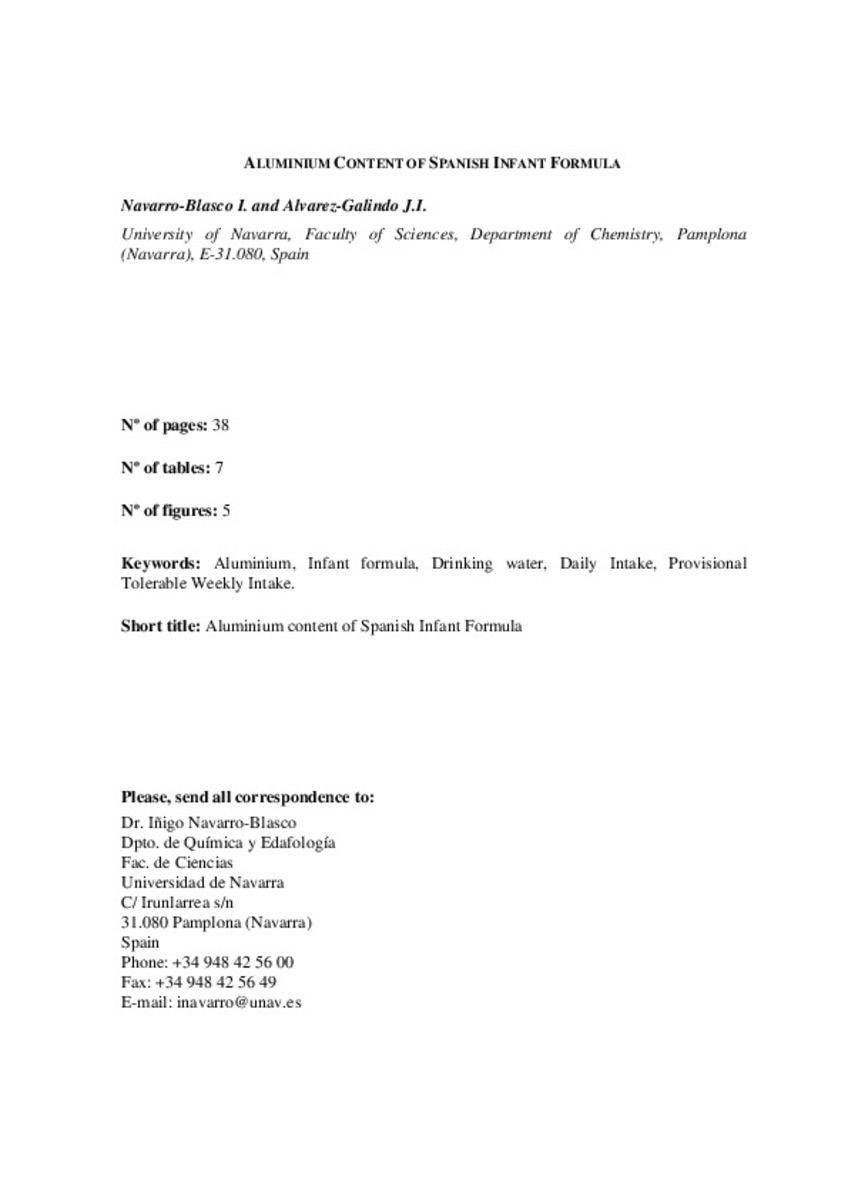Full metadata record
| DC Field | Value | Language |
|---|---|---|
| dc.creator | Navarro-Blasco, I. (Iñigo) | - |
| dc.creator | Alvarez-Galindo, J.I. (José Ignacio) | - |
| dc.date.accessioned | 2018-01-12T08:46:15Z | - |
| dc.date.available | 2018-01-12T08:46:15Z | - |
| dc.date.issued | 2003 | - |
| dc.identifier.citation | Navarro-Blasco, I. (Íñigo); Alvarez, J.I. (José Ignacio). "Aluminium content of spanish infant formula". Food Additives and Contaminants. 20 (5), 2003, 470 - 481 | es_ES |
| dc.identifier.issn | 0265-203X | - |
| dc.identifier.uri | https://hdl.handle.net/10171/45632 | - |
| dc.description.abstract | Aluminium toxicity has been relatively well documented in infants with impaired renal function and premature neonates. The aims of this study were to analyse the concentration of aluminium in the majority of infant formulae sold commercially in Spain, to determine the influence of aluminium content in the tap water in reconstituted powder formulae and to estimate the theoretical toxic aluminium intake in comparison with the PTWI, and lastly, to discuss the possible interactions of certain essential trace elements added to formulation with aluminium according to type or main protein based infant formula. A total of 82 different infant formulae from 9 different manufacturers were studied. Sample digestion was simulated in a closed acid-decomposition microwave system. Aluminium concentration was determined by atomic absorption spectrophotometry with graphite furnace. In general, the infant formulae studied provide an aluminium level higher than that found in human milk, especially in the case of soya, preterm or hydrolysed casein-based formulae. Standard formulae provide lower aluminium intakes amounting to about 4 % PTWI. Specialised and preterm formulae result in moderate intake (11 – 12 % and 8 – 10 % PTWI, respectively). Soya formulae contribute the highest intake (15 % PTWI). Aluminium exposure from drinking water used for powder formula reconstitution is not considered a clear potential risk. In accordance with the present state of knowledge about aluminium toxicity, it seems prudent to call for continued efforts to standardise routine quality control and reduce aluminium levels in infant formula as well as to keep the aluminium concentration under 300 g l-1 for all infant formulae, most specifically those formulae for premature and low birth neonates. | es_ES |
| dc.language.iso | eng | es_ES |
| dc.rights | info:eu-repo/semantics/openAccess | es_ES |
| dc.subject | Aluminium | es_ES |
| dc.subject | Infant formula | es_ES |
| dc.subject | Drinking water | es_ES |
| dc.subject | Daily intake | es_ES |
| dc.subject | Provisional tolerable weekly intake | es_ES |
| dc.title | Aluminium content of spanish infant formula | es_ES |
| dc.type | info:eu-repo/semantics/article | es_ES |
| dc.identifier.doi | 10.1080/0265203031000098704 | - |
Files in This Item:
Statistics and impact
Items in Dadun are protected by copyright, with all rights reserved, unless otherwise indicated.






